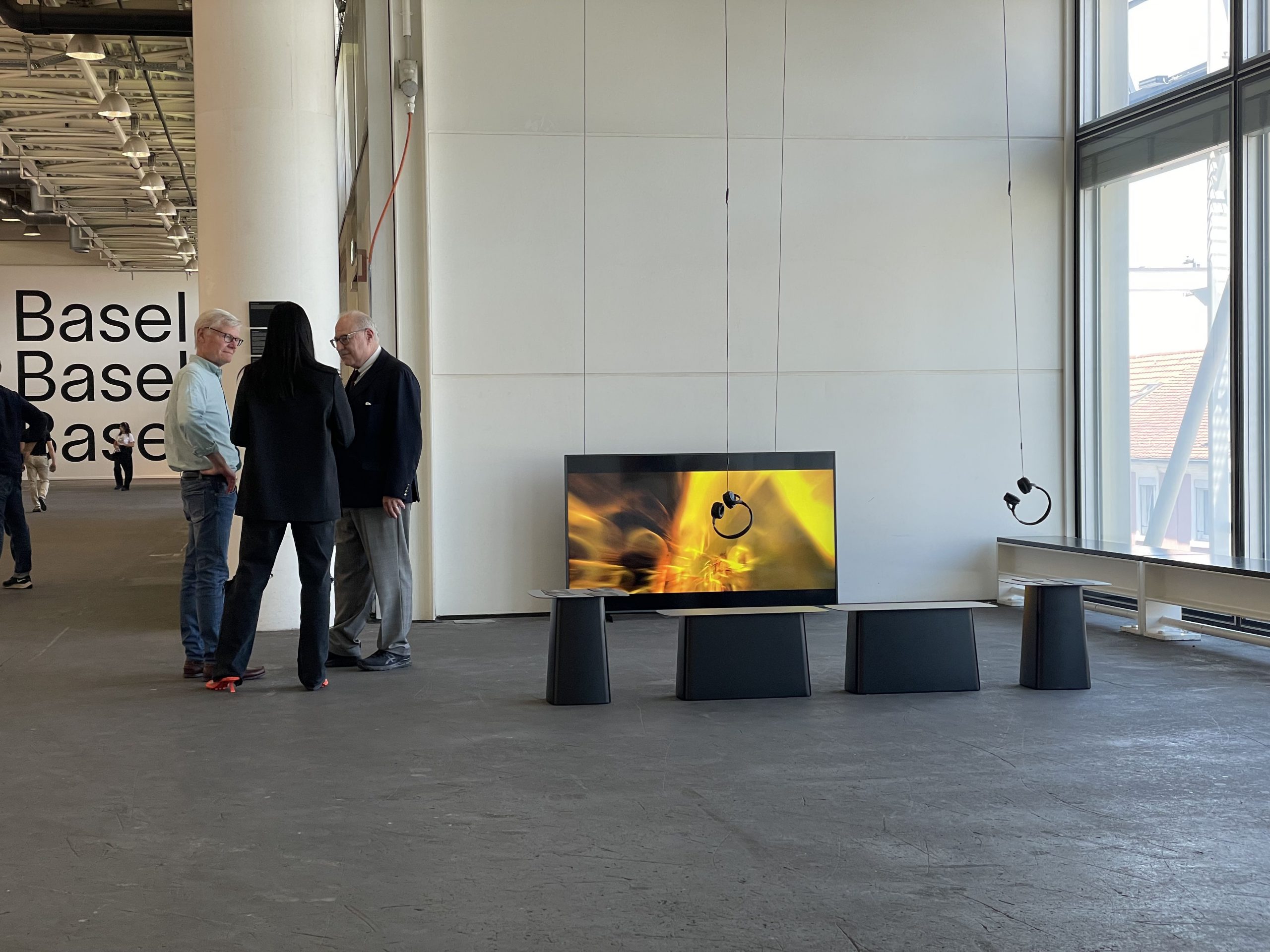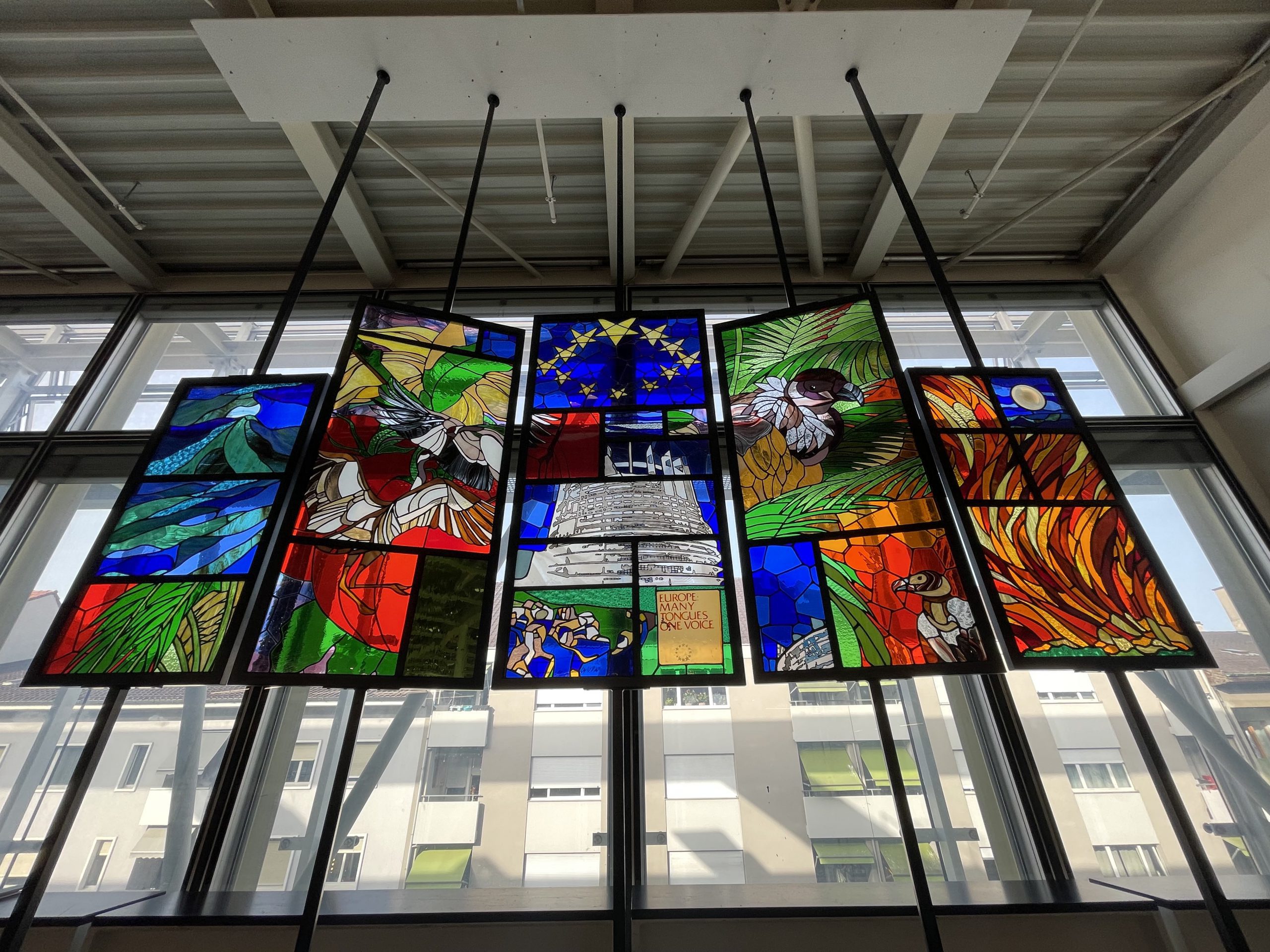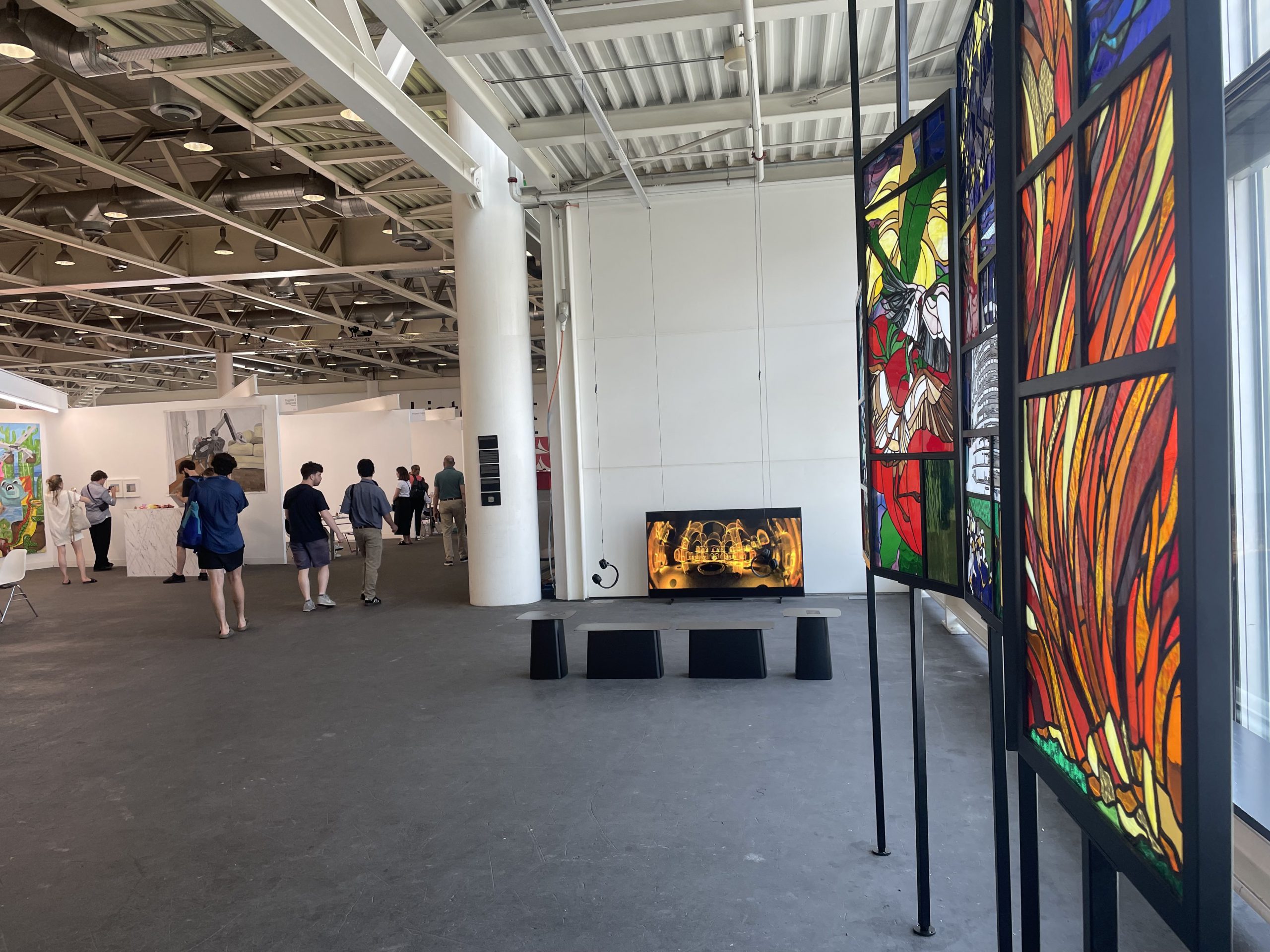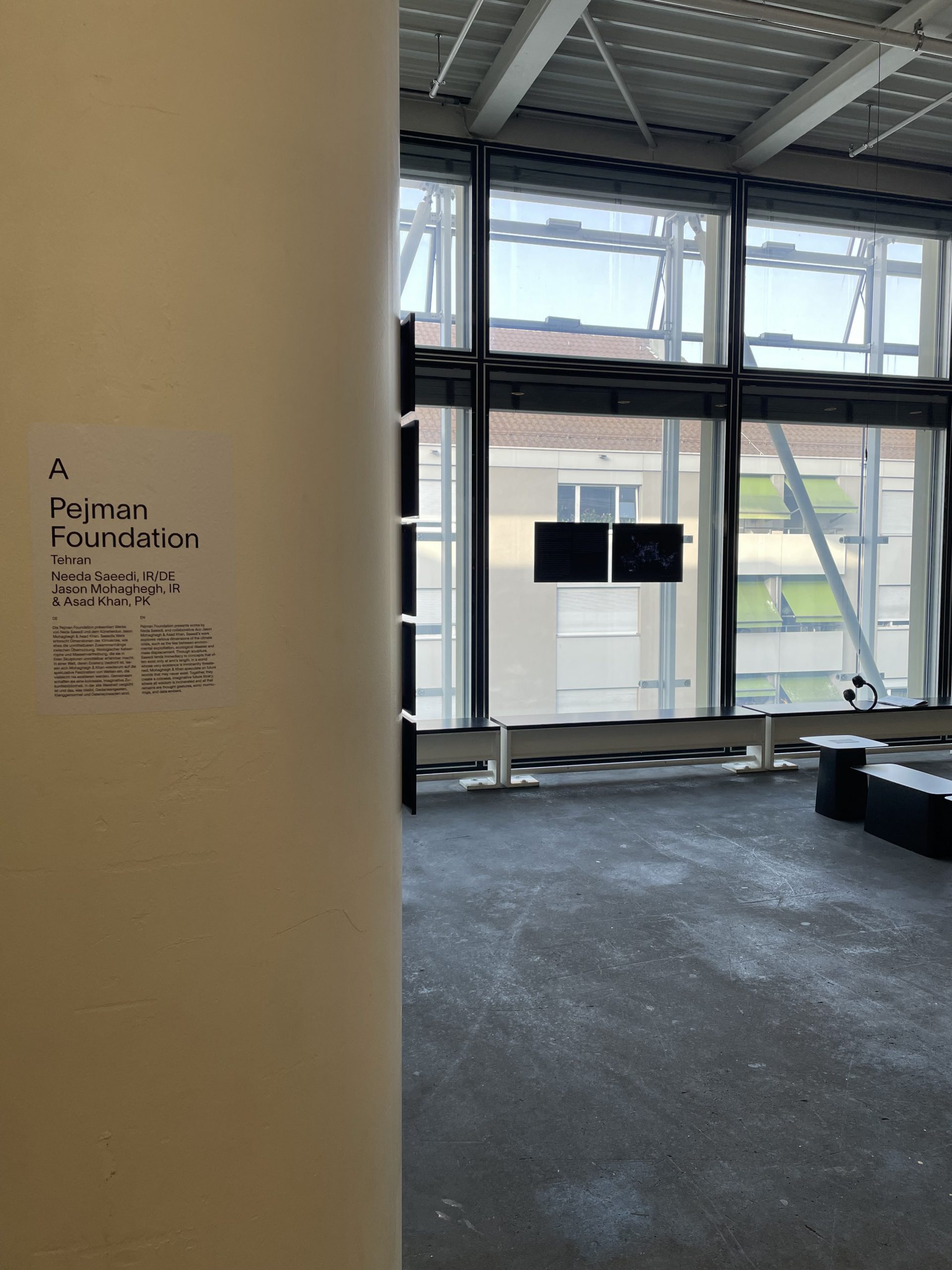Pejman Foundation will be in Liste Art Fair Basel 2022 as a special guest, presenting works by Neda Saeedi and the collaborative duo Jason Mohaghegh and Asad Khan.
Liste Art Fair Basel was founded in 1996 and hosts international galleries and artists each year, focusing on new discoveries and the latest developments in contemporary art. This one-week event, takes place in June during Basel Art Week, at the same time as Art Basel, and provides a space for developing regions and emerging artists to present their work and attract audiences, meet and connect with art professionals and introduce new values and media.
Each year, other than participants, Liste Art Fair Basel invites institutions, magazines, and artist projects to present special programs within the context of the fair. We are pleased to inform you that one of the special guests this year is going to be Pejman Foundation, presenting works by Neda Saeedi, and the collaborative duo, Jason Mohaghegh & Asad Khan.
Artists Biographies
Neda Saeedi
Neda Saeedi, born in 1987 in Tehran, an Iranian-German artist, lives and works in Berlin. She studied classical sculpture, under the supervision of Raffie Davtian in Tehran, followed by Fine Arts at the lens-based class of Professor Hito Steyelr at Berlin University of Arts. Her honors and achievements include the Villa Romana Prize, membership of International Research Fellow of Max-Planck-Institut in Florenz, the Kunstfonds Scholarship, and The Elsa Neumann Emerging Artist Prize.
The "Two Shades of Green" exhibition from the "In the Midst" Vol. 1 exhibition was held in Argo factory in March and April 2021 and later, her book "Return to Neverland - Conversation between Neda Saeedi and Homayoun Sirizi" was published by Pejman Foundation in 2021.
Collaborative duo Jason Mohaghegh and Asad Khan
Jason Mohaghegh is a researcher, writer, and professor of philosophy, comparative literature, psychoanalysis, and Middle Eastern studies. He is an associate professor at Babson College and has published five books. His work includes studying creative movements in the East and West, focusing on the concepts of chaos, illusion, violence, disappearance, delusion, silence, madness, apocalypse, night, and future. Mohaghegh is also the founding director of the Future Studies Program.
Asad Khan is a computational designer and architectural researcher completing a design-led doctorate at the University of Edinburgh. He directs the Entropy Project, which examines the architecture of existential risks and catastrophes as artifacts of design intelligence, using the epistemic filters of remote-sensing, artificial intelligence, computer simulation, and design automation to investigate spatial realities as time-bound self-exterminators. The Entropy project has been exhibited in various national and international galleries.
Jason Mohaghegh and Asad Khan recently collaborated on the "House of Second Wisdom" project.
Curatorial statement
Pejman Foundation presents works by Neda Saeedi, and collaborative duo Asad Khan & Jason Mohaghegh. Saeedi‘s work explores dimensions of the climate crisis, such as the ties between environmental exploitation, ecological disaster and mass displacement of people. Through sculpture, Saeedi lends immediacy to concepts that often exist only at arm‘s length. In a world whose very existence is imminently threatened, Khan & Mohaghegh speculate on worlds that may never exist. Together, they imagine and digitally architect unending worlds, dream-like libraries, rare atmospheres, and landscapes of contemplation.
Khan & Mohaghegh’s House of Second Wisdom is an immersive, imaginative archive partly inspired by the legendary House of Wisdom (Bayt al-Hikmah), a colossal library of 8th-century Baghdad, said to be home to the most illustrious collection of texts spread across innumerable aisles, and destroyed in the Mongol siege of Baghdad in 1258. The concept of a ’library’ also references Jorge Luis Borges’ The Library of Babel and Italo Calvino’s Invisible Cities, authors whose works experimented with fabricated libraries that unravel into eternity. Where House of Second Wisdom departs from its inspirations, however, is in its visualization. The worlds that Khan & Mohaghegh imagine are worlds that one may see.
Using a proprietary artificial intelligence algorithm developed by Khan, House of Second Wisdom is rendered using elaborate ‘point cloud data sets’. ‘Point cloud’ technology is a high resolution three-dimensional archiving of target surfaces, and has applications in robotic warfare, space exploration, and automated navigation. Despite the obscure nature of House of Second Wisdom, this project has profoundly timely implications for questions of knowledge, environment, sustainability, and society in our age of great disquiet. Both Mohaghegh & Khan are of non-western descent - with cultural ties to regions that are, at present, undergoing periods of war, chronic displacement, colonial invasion, totalitarian rule, and ecological disaster. In this context, the House of Second Wisdom represents paths of speculation, fascination, and imagination, a fantastical tribute to the notion of living on borrowed time.
Neda Saeedi’s Only Birds Who Fly The Highest Can Shatter The Windows takes after the ecclesiastical stained glass window and its narrative role in church architecture. The installation is built using traditional methods of stained glass production and depicts environmentally harmful cash crops, critically endangered migratory birds, and the main beneficiaries of the world’s extractive industries. The installation wryly suggests, via the central panel, a certain form of contemporary worship - an alternative altar framed by its excesses.
Consider that stained glass, as it is used in church architecture, conveys a message generally believed by those sitting in its filtered light. If one takes Only Birds Who Fly The Highest Can Shatter The Windows to be a reflection on climate change, then in this case, there is no overarching belief. In fact, environmental degradation and the broader Anthropocene, a scientific term given to the time (now) during which humans have had substantial impact on our planet, remain hotly contested among skeptics and special interest groups the world over.
Pejman Foundation Team at Liste Art Fair
Founder & Executive Director: Hamidreza Pejman
Project Manager & Curator: Carolyn Tso
Project Assistants: Shakiba Abdollahian & Sarvenaz Foroutani
Project Technician: Arya Tabandehpour
Special thanks to Sima Naeimi
Liste Art Fair Basel was founded in 1996 and hosts international galleries and artists each year, focusing on new discoveries and the latest developments in contemporary art. This one-week event, takes place in June during Basel Art Week, at the same time as Art Basel, and provides a space for developing regions and emerging artists to present their work and attract audiences, meet and connect with art professionals and introduce new values and media.
Each year, other than participants, Liste Art Fair Basel invites institutions, magazines, and artist projects to present special programs within the context of the fair. We are pleased to inform you that one of the special guests this year is going to be Pejman Foundation, presenting works by Neda Saeedi, and the collaborative duo, Jason Mohaghegh & Asad Khan.
Artists Biographies
Neda Saeedi
Neda Saeedi, born in 1987 in Tehran, an Iranian-German artist, lives and works in Berlin. She studied classical sculpture, under the supervision of Raffie Davtian in Tehran, followed by Fine Arts at the lens-based class of Professor Hito Steyelr at Berlin University of Arts. Her honors and achievements include the Villa Romana Prize, membership of International Research Fellow of Max-Planck-Institut in Florenz, the Kunstfonds Scholarship, and The Elsa Neumann Emerging Artist Prize.
The "Two Shades of Green" exhibition from the "In the Midst" Vol. 1 exhibition was held in Argo factory in March and April 2021 and later, her book "Return to Neverland - Conversation between Neda Saeedi and Homayoun Sirizi" was published by Pejman Foundation in 2021.
Collaborative duo Jason Mohaghegh and Asad Khan
Jason Mohaghegh is a researcher, writer, and professor of philosophy, comparative literature, psychoanalysis, and Middle Eastern studies. He is an associate professor at Babson College and has published five books. His work includes studying creative movements in the East and West, focusing on the concepts of chaos, illusion, violence, disappearance, delusion, silence, madness, apocalypse, night, and future. Mohaghegh is also the founding director of the Future Studies Program.
Asad Khan is a computational designer and architectural researcher completing a design-led doctorate at the University of Edinburgh. He directs the Entropy Project, which examines the architecture of existential risks and catastrophes as artifacts of design intelligence, using the epistemic filters of remote-sensing, artificial intelligence, computer simulation, and design automation to investigate spatial realities as time-bound self-exterminators. The Entropy project has been exhibited in various national and international galleries.
Jason Mohaghegh and Asad Khan recently collaborated on the "House of Second Wisdom" project.
Curatorial statement
Pejman Foundation presents works by Neda Saeedi, and collaborative duo Asad Khan & Jason Mohaghegh. Saeedi‘s work explores dimensions of the climate crisis, such as the ties between environmental exploitation, ecological disaster and mass displacement of people. Through sculpture, Saeedi lends immediacy to concepts that often exist only at arm‘s length. In a world whose very existence is imminently threatened, Khan & Mohaghegh speculate on worlds that may never exist. Together, they imagine and digitally architect unending worlds, dream-like libraries, rare atmospheres, and landscapes of contemplation.
Khan & Mohaghegh’s House of Second Wisdom is an immersive, imaginative archive partly inspired by the legendary House of Wisdom (Bayt al-Hikmah), a colossal library of 8th-century Baghdad, said to be home to the most illustrious collection of texts spread across innumerable aisles, and destroyed in the Mongol siege of Baghdad in 1258. The concept of a ’library’ also references Jorge Luis Borges’ The Library of Babel and Italo Calvino’s Invisible Cities, authors whose works experimented with fabricated libraries that unravel into eternity. Where House of Second Wisdom departs from its inspirations, however, is in its visualization. The worlds that Khan & Mohaghegh imagine are worlds that one may see.
Using a proprietary artificial intelligence algorithm developed by Khan, House of Second Wisdom is rendered using elaborate ‘point cloud data sets’. ‘Point cloud’ technology is a high resolution three-dimensional archiving of target surfaces, and has applications in robotic warfare, space exploration, and automated navigation. Despite the obscure nature of House of Second Wisdom, this project has profoundly timely implications for questions of knowledge, environment, sustainability, and society in our age of great disquiet. Both Mohaghegh & Khan are of non-western descent - with cultural ties to regions that are, at present, undergoing periods of war, chronic displacement, colonial invasion, totalitarian rule, and ecological disaster. In this context, the House of Second Wisdom represents paths of speculation, fascination, and imagination, a fantastical tribute to the notion of living on borrowed time.
Neda Saeedi’s Only Birds Who Fly The Highest Can Shatter The Windows takes after the ecclesiastical stained glass window and its narrative role in church architecture. The installation is built using traditional methods of stained glass production and depicts environmentally harmful cash crops, critically endangered migratory birds, and the main beneficiaries of the world’s extractive industries. The installation wryly suggests, via the central panel, a certain form of contemporary worship - an alternative altar framed by its excesses.
Consider that stained glass, as it is used in church architecture, conveys a message generally believed by those sitting in its filtered light. If one takes Only Birds Who Fly The Highest Can Shatter The Windows to be a reflection on climate change, then in this case, there is no overarching belief. In fact, environmental degradation and the broader Anthropocene, a scientific term given to the time (now) during which humans have had substantial impact on our planet, remain hotly contested among skeptics and special interest groups the world over.
Pejman Foundation Team at Liste Art Fair
Founder & Executive Director: Hamidreza Pejman
Project Manager & Curator: Carolyn Tso
Project Assistants: Shakiba Abdollahian & Sarvenaz Foroutani
Project Technician: Arya Tabandehpour
Special thanks to Sima Naeimi











